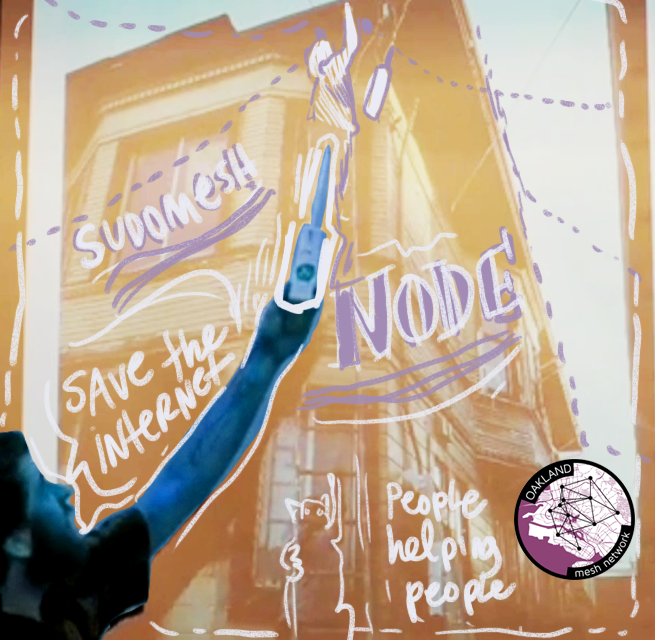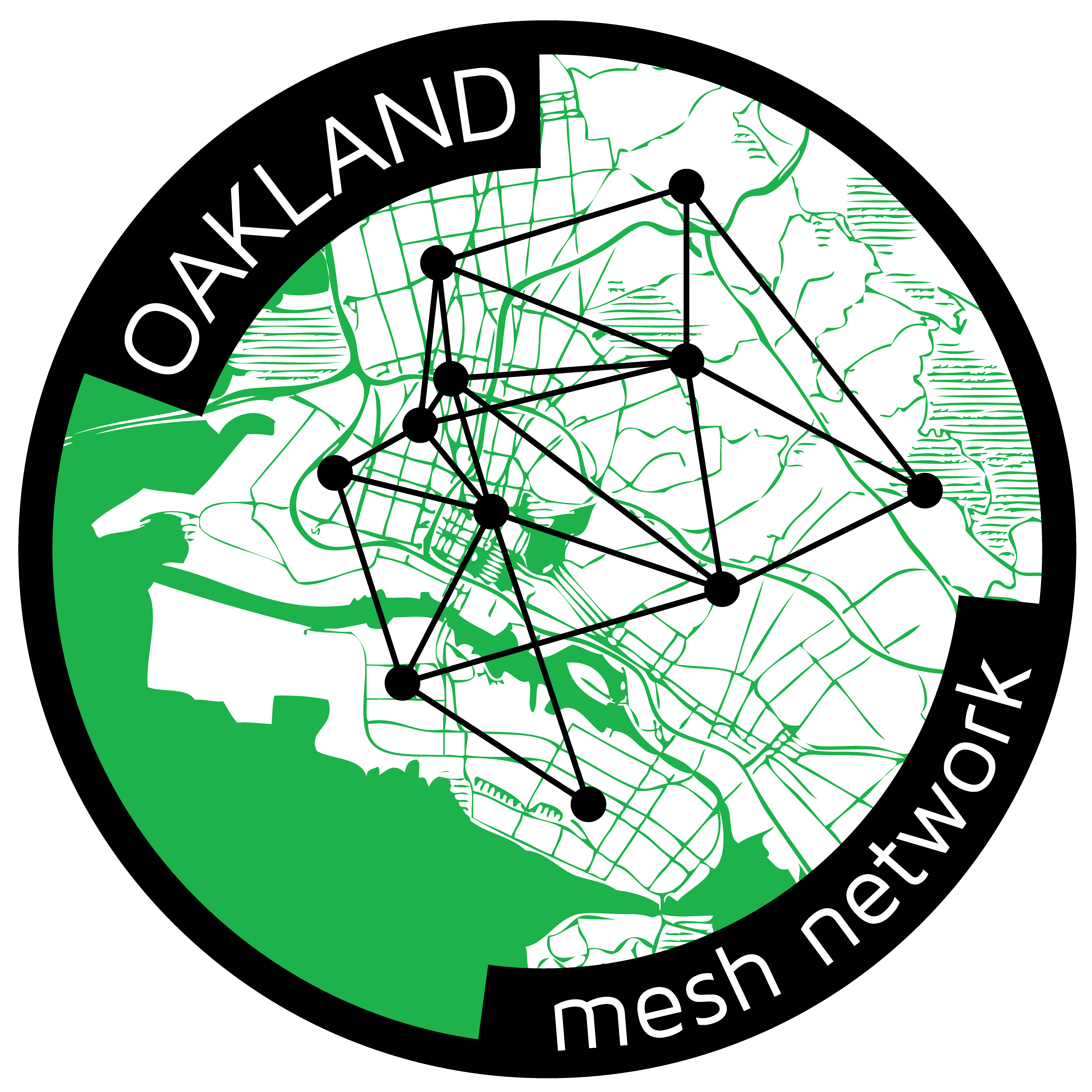Mesh
sudomesh is a group of volunteers operating out of the sudo room hackerspace at the Omni Commons - a collective of collectives stewarding a large community space in Oakland, California. We develop software and assemble hardware systems to help build open community networks like the People's Open Network, a community-owned and -operated non-profit internet infrastructure in Oakland.
We're a people-powered project. That means that anyone can join the network if they're willing to contribute by reporting bugs, improving software, fixing hardware, setting up a node, installing rooftop nodes, telling your friends about us, joining for a workshop, bringing pizza to a hack session, donating equipment/money/Bitcoin, learning with us about how the internet works, or just being patient if something is broken :)
You can read about our progress on our blog.
Interested in learning more and exploring? Check out our Join Us section. You do not need to be technically skilled to be part of this project. We need people willing to mount gear on rooftops, folks who want to do public outreach, graphic design artists, film-makers, documentarians and so much more! Show up at a monthly general meeting and get involved!
| Documentation | Technical | Outreach | Operations | Research | External Links |
|---|---|---|---|---|---|
| Install Instructions | Overview | FAQ | Minutes | User Research | peoplesopen.net |
| Net Topology | Hardware | Blog | To-Do's | SF Bay Area | network map |
| Presentations | Power | How to Help | Legal | Interviews | code on github |
| History | Security | Wishlist | Inventory | Other Meshes | DisasterRadio |
| Press | Backup | Website | Meetings | Software Tools | BuildYourOwnInter.Net |
| Firmware | Hosting | Propaganda | Funding | Local Services | |
| Mounting | Decisions | Self-Education | |||
| Next gen |
Intro
Imagine if the wifi router in your home connected to the wifi routers in your neighbours' homes and they again connected to their neighbours to form a huge free wireless network spanning the city! That's exactly what a mesh network is, or at least what it can be. Roads and telephone poles are owned by government or private interests and laying down cable is expensive, but by using wireless signals that hop from building to building we can create a community-owned and -operated, free-as-in-freedom alternative to corporate Internet Service Providers. Community wireless mesh networks are growing around the world, creating local 'internets' that support Net Neutrality and community control of critical infrastructure.
sudo mesh is a non-profit organization consisting of a group of unpaid volunteers who are building the People's Open Network. Our mission is building open technology that helps to connect our neighbors, support local businesses, and enable community collaboration and cultural production. In the event of a natural disaster or state censorship, a community mesh network can be a resilient means of communication and sharing of information.
We are spending a lot of time developing software to make it cheap and easy for anyone to be part of People's Open Network, regardless of technical skill.
Join Us
Ways to participate:
- Join the email list
- Follow us on twitter and like us on facebook.
- We have weekly meetings from 7:30-9pm at sudo room. We have focus groups and collaborate on different parts of the project - from design to software development, documentation to hardware hacking, community outreach and climbing rooftops to mount nodes!
- For the sake of time, we don't use Tuesday meetings to introduce folks to the project. If you do not feel ready to jump right in and start contributing, please join us during our "Build Your Own Internet (BYOI)" open hours on Sundays from 1-3pm at sudo room :D
- Chat with us on IRC: #peoplesopen.net (see also IRC Intro)
- We generally collaborate on [1] at each meeting. Look at our archive of past meeting minutes!
- Contribute to the network by installing a mesh node at your location using our handy Mesh Node Setup Walkthrough. This is especially helpful for those who are within range of an existing node (seen as a wireless SSID named "peoplesopen.net").
If you want to join the mesh you'll need a mesh router at your home! Currently the best way to get one is to show up at our monthly general meeting as described above :)
How to Help
We need more people on the network to improve the quality of the service. When you setup a node, you improve the service for everybody on the network and give more access to your community. We encourage participants to ask their communities to join their networks and create distributed services for them. We have a user guide to help you get on the network!
- Check out our ToDo list
- Support us with a small monthly donation on Patreon, here's how we spend it.
- Send bitcoins to our wallet address: 12RxU4DpLpdWcmEBn7Tj325CCXBwt5i9Hc
- Check out our wishlist, we have requests!
- Come to our meetings in Oakland! (listed above)
- Improve our documentation
- Talk to your community about joining the mesh - here are some resources for doing so!
Developers
We need hardware and software engineers to help us with our code. We have an overview of technical documentation that will be helpful in understanding the network.
If you want to immediately help, check out our code or look at our remaining issues for upcoming milestones.
Here are some of the projects that need attention:
- Firmware - The sudowrt firmware
- sudowrt-web-ui - The new and improved web admin UI for sudowrt nodes
- ubus-https-forwarder - Allow management of extender nodes from home node web UI
- The Service Browser - Web UI for browsing mesh services
- Mesh Services - Which services should we provide?
Designers
We need artists and designers to make things look nice! We have design schemes we already use, but we're always looking to improve it. We need to improve our presentation content and diagrams too! We've been focused on these areas:
- Mesh/Presentations - Past presentations, talks, workshops, tutorials and videos
- Diagrams - Diagrams outlining the network topology and technical stack
- Design - Website & logo design; swag for enthusiasts; and marketing inspiration.
Frequently Asked Questions (FAQs)
- Decisions - What decisions have we made, and why?
- Funding - How the heck do we fund this thing?
- Legal - How do we use exit nodes, relays and legal structures to protect node owners and ourselves?
- Hosting - How are we hosting and what does it cost?
- Backup - How do we handle backups?
- Server Security - How do we ensure server security?
Logistics
- Meeting Minutes - Notes from our weekly meetings dating back to January 2013.
- Inventory - Continually-updated inventory of our hardware and gear.
- Taxes - Filed taxes for the sudo mesh non-profit
Research
We need help improving our documentation about the area and other legalities.
- Interviews - we interviewed other experienced meshers
- Other documentation - books, articles, wikis, blog posts.
- Oakland - information and resources pertaining to Oakland community organizations, wireless initiatives, policy and research initiatives
- Municipal projects - examples of progressive uses of municipal networks.
- Decentralized FM/AM radio - Bit of research on adding legal FM/AM transmitters to nodes.
Other Firmware and Networks
There are mesh projects around the world that have inspired us to make our own network!
- wlan_slovenija (Slovenia) - mesh network in Slovenia with the first cross-country links to Austria and Croatia! wlan-sl developers have been incredibly helpful mentors since the beginning of the sudomesh project, and are the founders of the Nodewatcher admin database as well as the Koruza wireless optical link project.
- Freifunk (Germany) - the creators of batman-adv and one of the longest-running mesh networks in the world.
- Guifi (Catalonia) - largest community network (using a variety of topologies) in the world - spanning upwards of 22,000 nodes across catalonia and spain. Guifi folks have also been incredibly supportive of sudo mesh and helpful in guiding the international movement toward community wireless networks.
- Altermundi (Argentina) - Connecting rural communities in Argentina to the Internet using long range point-to-point links connecting community mesh networks. Developers from Altermundi also contribute extensively to the Libremesh firmware and Librerouter, an open hardware mesh router in development.
- Funkfeuer (Austria) - another old-school mesh network
- Ninux (Italy) - Spanning several cities across Italy, Ninux developers also contribute extensively to research on community networks, the dashboard admin interface NodeShot, and LibreMesh / Librerouter
- Mesh/Commotion - a very well-documented project from the Open Technology Institute creating a simple-to-deploy mesh firmware and setup for small community meshes around the world.
- AREDN Amateur (HAM) Radio mesh net - building a mesh backbone on mountaintops.
- BBHN Broadband Ham Net
Web Resources
- Tidepools - Jenny Ryan designed local use cases for a community mobile mapping application built to run on mesh networks.
- Project Meshnet - Extensive wiki on the /r/darknet project, including extensive list of projects coordinating with them.
- Long Range Wifi - Info on the longest-range wifi connections ever made.
- Adafruit's Web IDE built for Raspberry Pi but probably good for editing code on any device and ensuring it is managed with a code repo. By default it uses bitbucket.org but it could probably be configured for Github.
Please note that all contributions to Sudo Room may be edited, altered, or removed by other contributors. If you do not want your writing to be edited mercilessly, then do not submit it here. You are also promising us that you wrote this yourself, or copied it from a public domain or similar free resource (see Sudo Room:Copyrights for details). Do not submit copyrighted work without permission!


